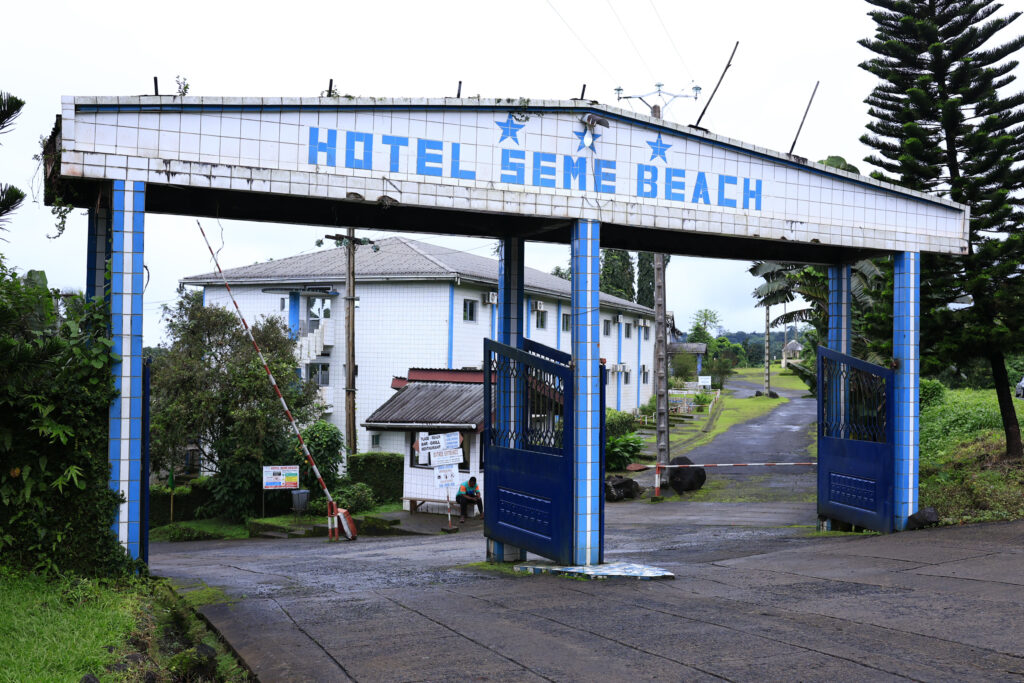Yann Anoko fondly remembers the days when tourists would flock to his hotel in southwestern Cameroon, before the English-speaking region’s decade-long separatist conflict put paid to the boom.Where visitors once used to throng Limbe’s spectacular beaches of black volcanic sand, holidaymakers have become scarce since fighters from the country’s anglophone minority mounted a revolt in 2016.”This parking lot has space for 300 cars. Today there are just four,” sighed Anoko, manager of the Seme Beach Hotel on the outskirts of Limbe.Separatists took up arms after the government brutally crushed protests by English-speakers angry at what they saw as their marginalisation in the mostly francophone country. At least 6,000 people have been killed in fighting.In recent years the conflict has eased, though tensions have risen with Cameroon’s upcoming presidential election on October 12.While the separatists are still largely active in neighbouring North-West Cameroon, the army’s presence in the big towns of the South-West region, Limbe included, brings a measure of stability and security.But “the English-speakers’ demands have created panic” among prospective tourists, said Anoko.- Lakes and elephants -With business sharply declining, he told AFP he had reduced the number of beds by half, leaving entire buildings of his vast hotel abandoned, and laid off three-quarters of his staff.It is a far cry from the hotel’s golden age, said Cyprine Okulodomo, the Seme Beach’s gardener of 15 years.During the week, the region’s oil industry brought business officials, congresses and seminars to the establishment.At the weekend, tourists came to plunge in the crystalline waters of the nearby lakes and rivers, observe forest elephants, or visit the Bimbia fort, a monument to the transatlantic slave trade.Others marvelled at the uncanny landscape of charcoal-dark beach on the flanks of Mount Cameroon, the still-active volcano looming over the area. “It was much better. We had customers. Tourists came from all over,” said Okulodomo.- ‘Ghost town’ restrictions -Since the crisis began, the separatists have called for a “ghost town” strike each Monday, with shops shuttering and locals told to stay at home.With the presidential election approaching, the “ghost town” has been extended to cover the whole working week.Anoko acknowledged that the measure was “not unrest, it’s a peaceful strike”.”But it paralyses economic activity: some businesses don’t open outside of Saturday and Sunday, while the hotels are open but have no clients.”According to local media, some officials have tried to limit the damage by penalising businesses that heed the call to strike.During the last presidential vote in 2018, turnout was especially low in the English-speaking western regions.That election saw President Paul Biya, who at 92 is the world’s oldest head of state, extend his decades-long grip on power.- Biya election rally -In the coastal village of Idenau, near Limbe, some 200 people attended a recent meeting of Biya’s RDPC party.Biya, who has not attended a single campaign event for a vote he is widely expected to win, was nowhere to be seen.Soldiers armed with assault rifles watched over the crowd.”It is really very peaceful here,” said Nina Gaelle, reassured by the visible presence of the military.She described herself as a “refugee”, having arrived seven years ago from a village in the North-West, where the grip of the “Amba-boys”, the armed separatist militias, is stronger.Kidnappings and murders of civilians are frequent there and schools and other symbols of government power are regularly hit by attacks.- Visitors fear war -Opened three years ago in Idenau, the All Eyes On Me, a small hotel with 10 rooms, carries on its business despite the crisis, with a clientele consisting largely of businessmen on their way to or from neighbouring Nigeria.In other regions, its clients could find themselves “stranded on the road due to ghost town operations”. But not here, Eric Mohntoh, the hotel manager said.Aware of being “in a hotspot for international travellers”, the manager of one four-star hotel in Limbe said he hoped to eventually convince tourists to return.”Visitors are doubtful — they think there is a war, especially during election time.” But in fact “it’s very calm,” he insisted.”It takes a bit of time to convince people. We mainly do it through social media” and by inviting influencers to stay there, he said.Back at the Seme Beach Hotel, Anoko, who hoped for a swift end to the conflict and the tourists’ return, tried to console himself.”It could not get any worse,” he said.
